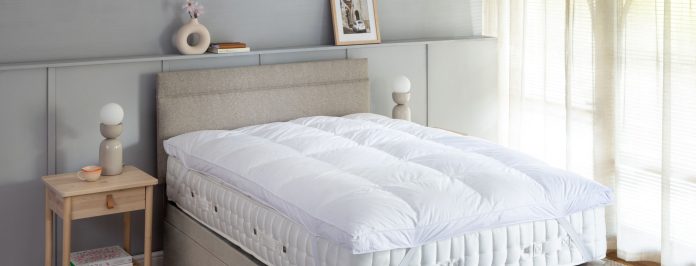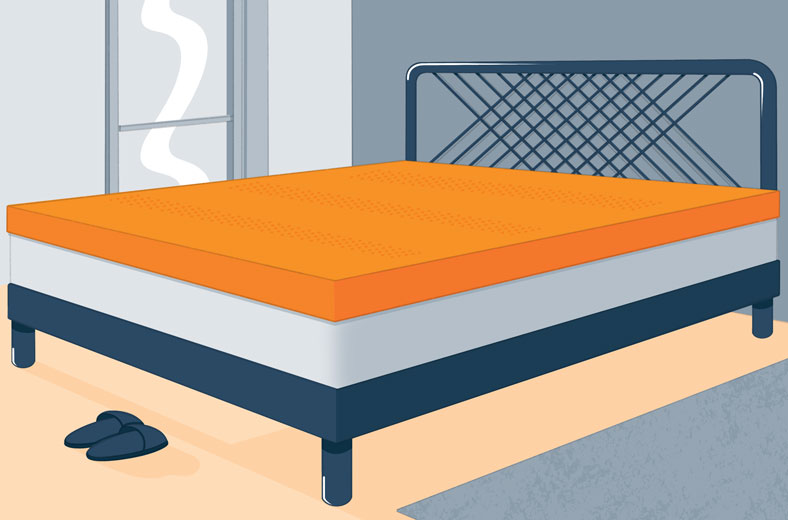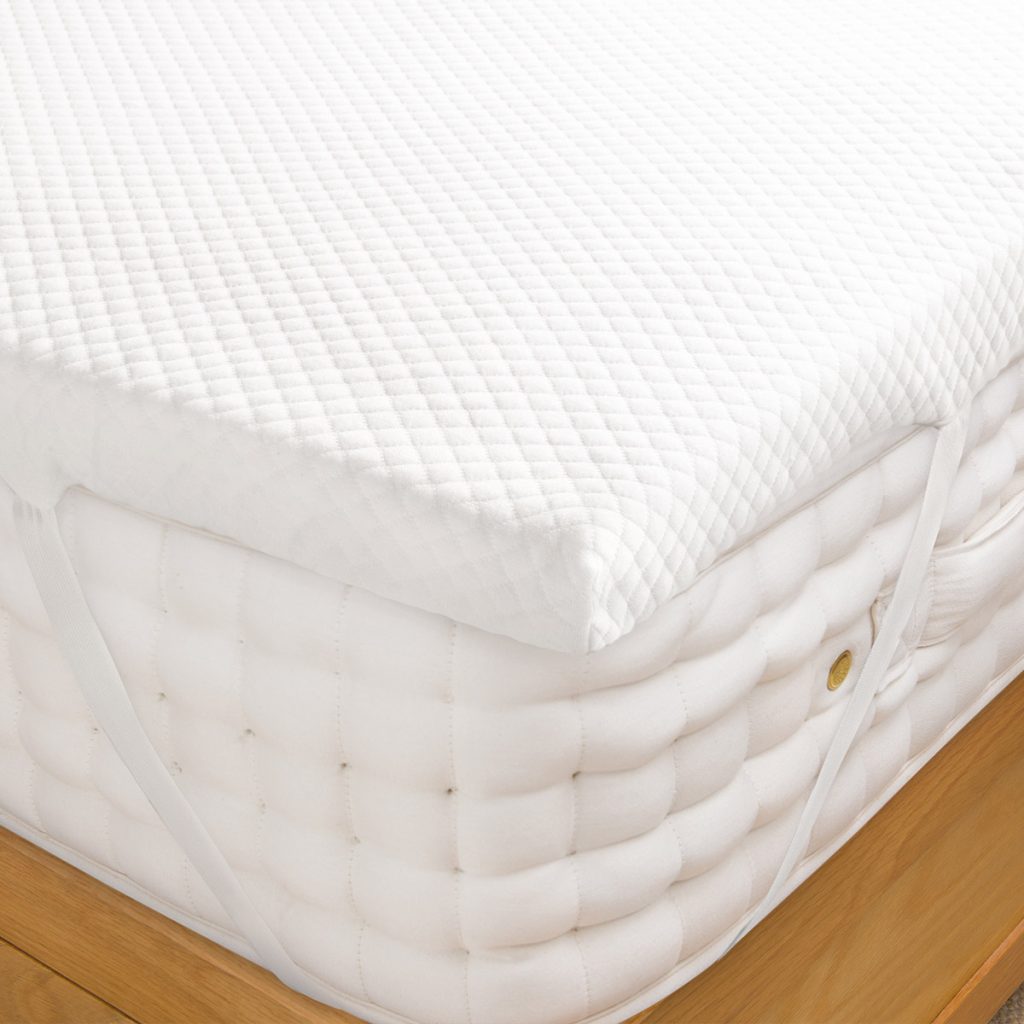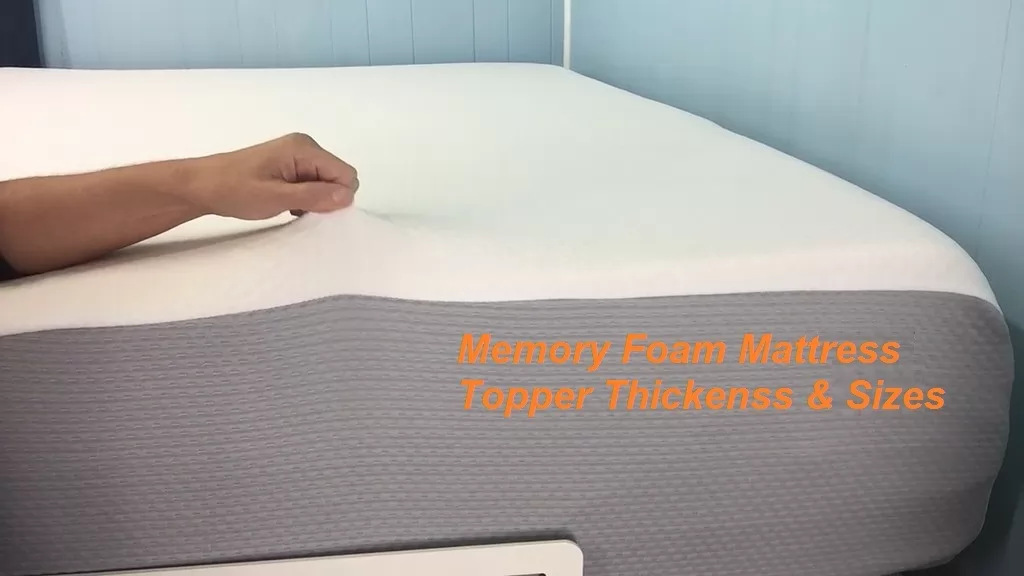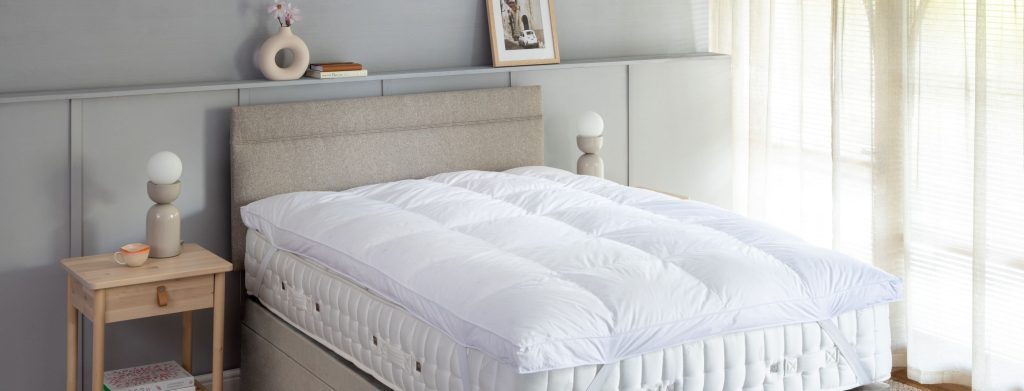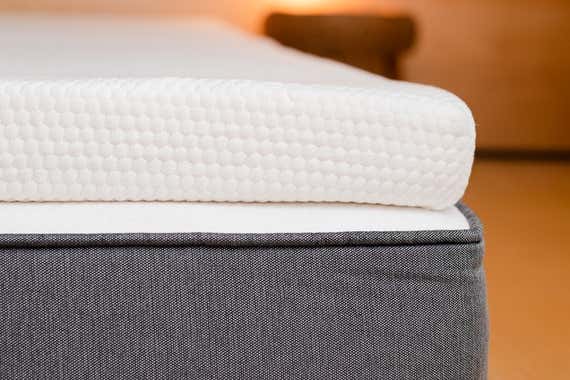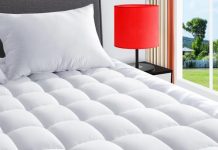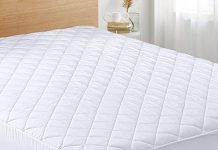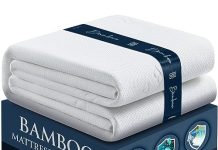Looking for the perfect mattress topper that will give you optimal comfort? Look no further! In this article, we will explore the ideal thickness for a mattress topper, ensuring that you get the luxurious sleep you deserve. Say goodbye to tossing and turning all night, as we guide you through the essential factors to consider when choosing a mattress topper thickness. Get ready to transform your sleep experience and wake up feeling refreshed and rejuvenated each morning.
Review contents
Choosing the Right Thickness
When it comes to choosing the right thickness for a mattress topper, there are several factors to consider. The thickness of the topper can have a significant impact on your overall comfort and sleep quality. Here, we will discuss some key considerations to help you determine the ideal thickness for your mattress topper.
Consider Your Sleeping Position
One important factor to consider when choosing the thickness of your mattress topper is your preferred sleeping position. Different sleeping positions require different levels of support and cushioning. For example, side sleepers may prefer a thicker topper to provide additional cushioning and relieve pressure on their hips and shoulders. On the other hand, back or stomach sleepers may find that a thinner topper provides adequate support without compromising spinal alignment.
Evaluate Your Current Mattress
Before deciding on the thickness of your mattress topper, it is essential to evaluate the condition of your current mattress. If your mattress is already in good shape and provides adequate support, you may not need a very thick topper. However, if your mattress is old or lacks cushioning, a thicker topper can help rejuvenate its comfort and support.
Personal Preference and Comfort Level
Ultimately, the thickness of your mattress topper should also be influenced by your personal preference and comfort level. Some individuals may find that a thicker topper provides a more luxurious and plush feel, while others may prefer a thinner topper for a firmer sleeping surface. It is important to consider your own preferences and how they align with the benefits of different thickness options.
Factors to Consider
Now that we have discussed the general considerations for choosing the right thickness, let’s delve into some specific factors that you should take into account.
Material of the Mattress Topper
The material of the mattress topper plays a crucial role in its overall performance and comfort. Different materials have different levels of firmness and support. For example, memory foam toppers are known for their contouring ability and pressure-relieving properties. Latex toppers, on the other hand, are more responsive and offer a balance of support and bounce. Understanding the characteristics of different materials can help you make an informed decision about the appropriate thickness.
Density and Firmness
The density and firmness of the mattress topper are directly related to its thickness. Typically, a thicker topper will have a higher density and offer more firmness. However, it is important to strike a balance between support and comfort. A topper that is too soft may not provide adequate support, while one that is too firm may feel uncomfortable. Consider your body weight and personal preference when determining the ideal density and firmness level.
Body Weight and Pressure Points
Your body weight and pressure points also play a significant role in determining the ideal thickness of your mattress topper. Heavier individuals may require a thicker topper to ensure proper weight distribution and alleviate pressure on their joints. If you have specific pressure points that require extra support and cushioning, a thicker topper can help provide targeted relief.
This image is property of www.sleepadvisor.org.
Benefits of Different Thicknesses
Now that we have discussed the factors to consider, let’s explore the benefits of different thickness options for mattress toppers.
1-inch Thickness
A 1-inch mattress topper is the thinnest option available. It offers a minimal layer of cushioning and may be suitable for individuals who want a slight enhancement to the comfort of their mattress without drastically changing its feel. A 1-inch topper can help protect your mattress from stains and spills while providing a small amount of extra padding.
2-inch Thickness
A 2-inch mattress topper provides a moderate level of cushioning and support. It can help improve the comfort of an older mattress or add an extra layer of softness to a firm mattress. A 2-inch topper is suitable for individuals who prefer a balanced feel and don’t require extensive support or pressure relief.
3-inch Thickness
A 3-inch mattress topper offers a substantial layer of cushioning and support. It is ideal for individuals who want to transform the feel of their mattress or alleviate pressure on their joints and muscles. A 3-inch topper can provide a plush and luxurious sleeping surface, especially for side sleepers or anyone seeking heightened comfort.
4-inch Thickness
A 4-inch mattress topper is the thickest option available and provides the maximum level of cushioning and support. This thickness is suitable for individuals who require extensive pressure relief or have specific medical conditions that require a softer sleeping surface. However, it is important to note that a 4-inch topper may significantly alter the feel of your mattress and may not be suitable for everyone.
Effects on Support and Alignment
The thickness of a mattress topper can have a significant impact on the support and alignment it provides. Let’s explore how different thickness options can affect your sleep posture.
Maintaining Proper Spinal Alignment
Proper spinal alignment is essential for a good night’s sleep and overall health. A mattress topper that is too thin may not provide adequate support, leading to an uncomfortable sleeping position and potential strain on your back. On the other hand, a thicker topper can help align your spine by contouring to your body’s curves and relieving pressure points. It is important to find the right balance of thickness to ensure proper spinal alignment throughout the night.
Targeting Specific Areas of Discomfort
If you experience specific areas of discomfort, such as back pain or joint pain, a thicker mattress topper can help alleviate these issues. The additional cushioning and support offered by a thicker topper can help relieve pressure on sensitive areas, reducing pain and promoting a more restful sleep. Consider the areas of your body that require extra support and choose a thickness that caters to those needs.
This image is property of www.soakandsleep.com.
Durability and Longevity
Another crucial aspect to consider when selecting the thickness of a mattress topper is its durability and longevity. Let’s explore how thickness can affect these factors.
Consider the Lifespan of the Topper
Thicker mattress toppers tend to have a longer lifespan compared to thinner options. The extra material and density of a thicker topper can contribute to its durability. If you are looking for a long-term investment, opting for a thicker topper may be a wise choice. However, it is important to consider other factors such as the quality of the materials used and the overall construction of the topper when assessing its lifespan.
Thickness and Wear and Tear
Thinner mattress toppers may be more susceptible to wear and tear over time, especially if they are subjected to regular use or heavier weight. The thin layers may compress and lose their supportive properties faster than thicker options. If you are concerned about the longevity of your topper, opting for a thicker option can help prolong its lifespan and maintain its comfort and support for a longer period.
Temperature Regulation and Breathability
The thickness of a mattress topper can also affect its temperature regulation and breathability. Let’s explore how different thickness options can impact these factors.
Airflow and Heat Dissipation
Thicker mattress toppers may hinder airflow and heat dissipation to some extent. The additional layers of foam or other materials can create a barrier that restricts the circulation of air around your body. This can potentially lead to a warmer sleeping surface, which may be uncomfortable for individuals who tend to sleep hot. If temperature regulation is a concern for you, consider opting for a thinner topper, or choose a model that incorporates cooling technologies.
Insulating Properties
On the other hand, a thicker mattress topper can also provide better insulation during colder months. The additional layers act as a buffer, trapping body heat and preventing it from dissipating into the surrounding environment. This can be beneficial for individuals who struggle with staying warm during the night. Consider the climate and your personal temperature preferences when deciding on the thickness of your mattress topper.
This image is property of medtrica.com.
Maintenance and Ease of Use
The thickness of a mattress topper can also affect its maintenance and ease of use. Let’s explore how different thickness options can impact these aspects.
Cleaning and Care
Thicker mattress toppers may require more effort to clean and maintain compared to thinner options. The additional layers can make the topper heavier and more cumbersome to handle, especially during the cleaning process. If you prefer a topper that is easy to clean and maintain, a thinner option may be more suitable. However, it is important to follow the manufacturer’s instructions for cleaning and care, regardless of the thickness.
Handling and Transport
Thicker mattress toppers can be bulkier and more challenging to handle and transport. If you anticipate needing to move or store your topper frequently, a thinner option may be more convenient. Thicker toppers may also require a mattress protector or deep-pocketed sheets to accommodate their increased height. Consider your specific needs and lifestyle when deciding on the thickness of your mattress topper.
Price and Affordability
The price of a mattress topper can vary based on its thickness. Let’s explore how different thickness options can affect the overall cost.
Comparing Costs Based on Thickness
Generally, thicker mattress toppers tend to be more expensive compared to their thinner counterparts. Thicker toppers require more materials and often have a higher density, which contributes to their higher price point. This price difference may be significant, especially when considering premium materials or advanced features. It is essential to determine your budget and weigh it against your comfort and support needs.
Value for Money
While thicker toppers may come with a higher price tag, they may also offer better value for money in the long run. Thicker options tend to be more durable and have a longer lifespan, providing extended comfort and support. Additionally, a thicker topper can help improve the longevity of your mattress by protecting it from wear and tear. Consider the overall value and return on investment when choosing the thickness of your mattress topper.
This image is property of www.soakandsleep.com.
Adjusting to a New Thickness
When transitioning to a new mattress topper with a different thickness, it is important to allow your body time to adjust. Here are some considerations to keep in mind during the acclimation period.
Gradual Acclimation Period
Your body needs time to adapt to the feel and support of a new mattress topper, especially if you are switching to a significantly different thickness. Consider gradually increasing the thickness over a few nights to allow your body to get accustomed to the new sleeping surface. This can help prevent discomfort or potential changes in your sleep posture.
Listening to Body’s Response
Pay attention to how your body responds to the new thickness of your mattress topper. If you experience discomfort or pain, it may be a sign that the thickness is not suitable for your needs. Adjusting the thickness or considering a different topper altogether can help ensure optimal comfort and sleep quality.
Considerations for Special Conditions
Individuals with specific conditions may have unique needs when it comes to the thickness of a mattress topper. Here are some considerations for common conditions.
Back Pain and Spine Issues
If you suffer from back pain or have spine issues, it is crucial to choose a mattress topper with the appropriate thickness. A thicker topper can provide additional support and cushioning, helping to alleviate pressure on the spine and reduce discomfort. Consult with a healthcare professional or orthopedic specialist to determine the ideal thickness that suits your specific condition.
Arthritis and Joint Pain
For individuals with arthritis or joint pain, a thicker mattress topper can help relieve pressure on sensitive joints and provide a more comfortable sleeping surface. The extra cushioning and support offered by a thicker topper can promote better sleep quality and help reduce pain. Consider a topper with memory foam or latex materials, as they are known for their pressure-relieving properties.
Allergies and Asthma
If you have allergies or asthma, a thinner mattress topper may be more suitable. Thicker toppers can trap dust mites, allergens, and pet dander, potentially exacerbating allergy symptoms or triggering asthma attacks. Choosing a hypoallergenic topper and proper cleaning and maintenance can help minimize these risks regardless of the thickness.
In conclusion, choosing the right thickness for a mattress topper involves considering several factors. Your sleeping position, evaluation of your current mattress, personal preferences, and comfort level are all important considerations. Additionally, factors such as material, density, body weight, and pressure points should be taken into account. The benefits of different thicknesses range from slight enhancements to significant pressure relief and comfort. The impact on support, alignment, durability, temperature regulation, and ease of maintenance should also be considered. Price and affordability are important factors, as well as the adjustment period and considerations for special conditions. By carefully considering all these factors, you can select the ideal thickness for your mattress topper and achieve optimal comfort and support for a restful night’s sleep.
This image is property of cdn.thewirecutter.com.

